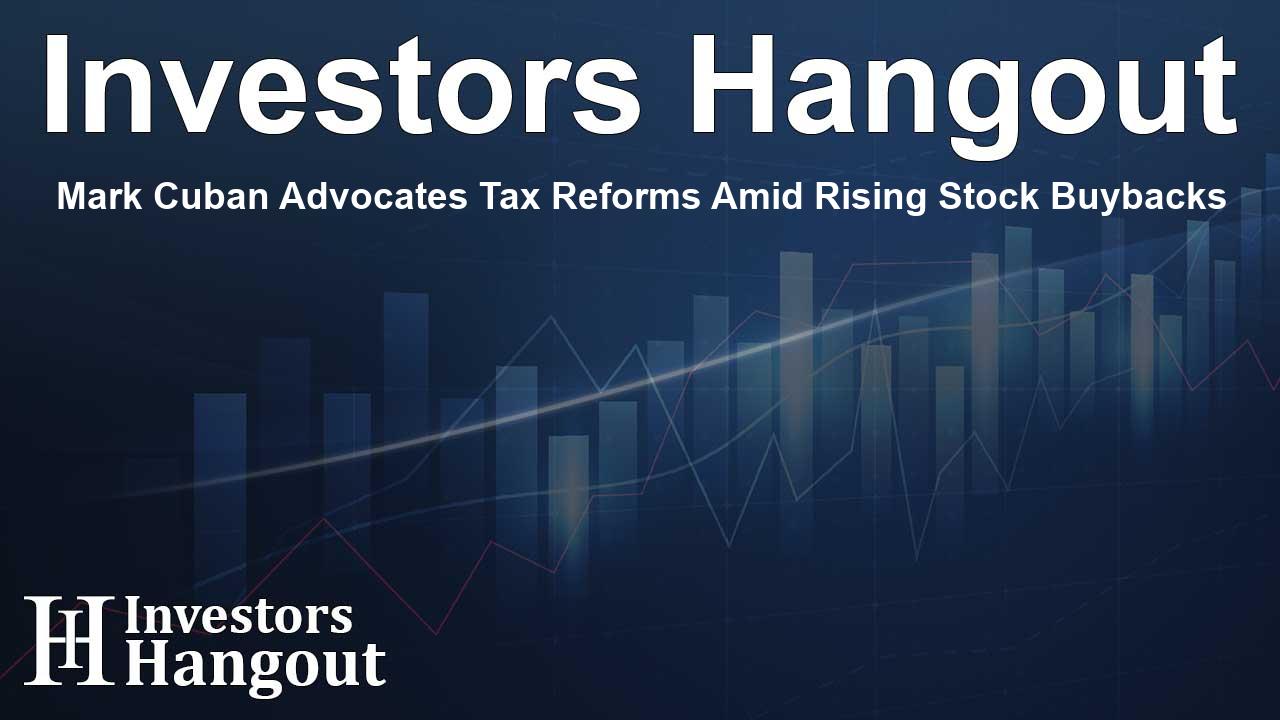Mark Cuban Advocates Tax Reforms Amid Rising Stock Buybacks

Stock Buybacks Set to Break Records
U.S. companies are projected to perform stock buybacks totaling an unprecedented $1.1 trillion by 2025, igniting discussions among influential figures like Mark Cuban and experts such as Georgetown University professor Rush Doshi regarding the implications of these financial practices.
Concerns Over Economic Impact
Rush Doshi, a prominent academic in economic policy, recently emphasized the staggering frequency of stock buybacks in the U.S., referring to data from Birinyi Associates, which highlights a historic trajectory dating back to 1982. He expressed concern over the sustainability of this approach, suggesting it might lead to deindustrialization. He elaborated, “American firms aren’t investing like their Chinese counterparts; they’re focused on buybacks instead.”
The Buyback Debate and Corporate Responsibility
Buybacks, frequently known as share repurchases, allow corporations to reclaim their shares from the marketplace, thereby boosting earnings per share and enhancing stock prices for their stakeholders. However, critics assert that this strategy can detract from more vital investments such as research and development that foster long-term growth and innovation.
Cuban Calls for a Billionaires' Tax on Buybacks
In response to the increasing concern raised by Doshi, Mark Cuban has publicly advocated for implementing a higher tax on stock buybacks, a measure he frames as a way to impose a tax on billionaires. Cuban argues that such a tax may not only enhance government revenue but also motivate corporations to reinvest in their workforce and growth initiatives.
Equitable Solutions Through Taxation
Mark Cuban took to social media to affirm his support, stating that increased taxes on buybacks could encourage companies to distribute profits back to shareholders through dividends, which contain tax benefits for many Americans. He wrote, "By purposefully taxing buybacks, we can simultaneously enhance tax revenues and support foundational wealth distribution among American households." This proposal aligns with ideas espoused by certain Democratic leaders seeking a refined tax structure that better reflects corporate responsibility.
Stock Market Trends and Buyback Activity
By early June 2025, companies listed on the S&P 500 had sanctioned a staggering $750 billion for stock buybacks, which is notably higher than previous years. This resurgence is driven primarily by sectors such as telecommunications, financial services, and technology.
Major Players in the Buyback Arena
Leading technology companies including Apple Inc. (NASDAQ: AAPL), Alphabet Inc. (NASDAQ: GOOG), and NVIDIA Corp. (NASDAQ: NVDA) have been at the forefront, collectively authorizing billions in stock repurchases. In addition, major banks like JPMorgan Chase & Co. (NYSE: JPM) and Bank of America Corp. (NYSE: BAC) have also allocated significant budgets for buybacks.
A Changing Landscape for Company Investments
Analysts suggest that the favorable market conditions will encourage these buyback activities to continue, promoting the importance of fiscal responsibility in publicly traded companies. Predicting future trends, firms must balance between buybacks and essential investments that will secure their competitive edge in the evolving marketplace.
Frequently Asked Questions
What are stock buybacks?
Stock buybacks occur when a company purchases its own shares from the market, which can reduce the number of shares outstanding and increase earnings per share.
Why are stock buybacks a controversial topic?
Critics argue that stock buybacks divert funds from critical areas such as research and development, which can negatively affect long-term growth prospects.
What is Mark Cuban's proposal regarding stock buybacks?
Cuban advocates for a tax on stock buybacks to encourage companies to reinvest their profits into their operations or distribute dividends fairly among shareholders.
Which companies are most active in stock buybacks?
Tech giants like Apple Inc. (NASDAQ: AAPL), Alphabet Inc. (NASDAQ: GOOG), and Nvidia Corp. (NASDAQ: NVDA) are among the leading companies engaging in stock buyback initiatives.
What effects can buyback taxes have on the economy?
Implementing taxes on buybacks may not only increase tax revenue but could also incentivize companies to reinvest in their growth strategies and workforce.
About The Author
Contact Kelly Martin privately here. Or send an email with ATTN: Kelly Martin as the subject to contact@investorshangout.com.
About Investors Hangout
Investors Hangout is a leading online stock forum for financial discussion and learning, offering a wide range of free tools and resources. It draws in traders of all levels, who exchange market knowledge, investigate trading tactics, and keep an eye on industry developments in real time. Featuring financial articles, stock message boards, quotes, charts, company profiles, and live news updates. Through cooperative learning and a wealth of informational resources, it helps users from novices creating their first portfolios to experts honing their techniques. Join Investors Hangout today: https://investorshangout.com/
The content of this article is based on factual, publicly available information and does not represent legal, financial, or investment advice. Investors Hangout does not offer financial advice, and the author is not a licensed financial advisor. Consult a qualified advisor before making any financial or investment decisions based on this article. This article should not be considered advice to purchase, sell, or hold any securities or other investments. If any of the material provided here is inaccurate, please contact us for corrections.
